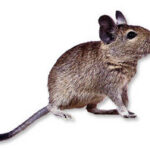This is in response to What is a Degu and Why You Should Own One, published on October 1, 2006.
I would like to clarify the word Degu. As many look at the word with a confused look on their face, it’s actually pronounced “day-goo”. Being a breeder as well as an employee of a veterinary hospital, I found that many do not even know of these wonderful critters. Which is bad in a way, because I’ve seen some mistreated for they do not know how to properly care for them.
I’d like to add the origination of the degu. It’s always good before owning a pet to know where they actually come from. Degus originated in Chile, from the West Coast to the Andes Mountains. They were transported to North America and Europe to be used in laboratories for diabetes testing. Degus cannot digest sugars properly making them the perfect candidate for this type of testing. In Europe, degus are available in most countries, as where they are very rare in the U.S. due to import restrictions that were placed on this species.
As said in the previous article, “This cute little animal looks like a rat but is not” is quite untrue. Well, yes, they are not a rat, but they do not look anything like one either. Degus are related to the popular Chinchilla although DNA research found that they are also closely related to the rabbit. Many compare them to the looks of a gerbil only being the size of a small guinea pig. They have big ears, long whiskers, and hairy little hands. They act much like squirrels, hence the nickname “the Chilean Squirrel”. It is not necessary to have a stone in their habitat for degus actually often nibble on their own claws so trimming is not needed.
As the other AC Producer mentioned, yes, they are very sociable animals. You should keep more than one at all times for the degu can die of loneliness. I do in turn disagree about the statement “You should make sure you have two of the same sex. If this is the case, they will fight'”. Well, I’m not actually sure where they were going with this, for it is a very contradicting statement. I will clarify from my experiences as a breeder. I have yet to see degus fight. In fact, females living in the same group have been shown to spontaneously nest communally; they nurse one another’s young. I do recommend though you either keep males and females separate to avoid over breeding and interbreeding or have one or all spayed or neutered. If your female gets pregnant a lot, this will also cut down her life expectancy. Speaking of pregnancy, I’d like to add a very interesting fact. Degus are born with their eyes open, have teeth and have fur as well.
They make all kinds of neat sounds and call to one another as well. They will even call for their owner for attention. They are also very intelligent and can recognize voices and other sounds. They can easily tell their owner from a stranger and definitely know the sound of their food container.
About their diet, I agree. The basis of a good degu diet is a combination of high quality chinchilla or guinea pig pellets (without molasses and other sugars of course). I’d like to add a few other things that degus can eat as well. They really love rodent blocks, although should only be given about one or two per degu per day. Grass hay (such as timothy hay) should be available all the time. Degu food is highly recommended because it is completely sugarless. It is very hard to find in the U.S. and can be very pricey, mostly because of shipping costs. One place that I know sells it is http://www.exoticnutrition.com/degu_food.htm.
A variety of fresh vegetables can be given, especially sweet potato (peeled, uncooked), carrots, broccoli, leafy greens, green beans, and dandelion leaves (must be pesticide-free). These should be offered in small quantities only or they may cause diarrhea. Vegetables that are members of the cabbage family (cabbage, broccoli, brussel sprouts, kale) should be fed only in very small quantities and some degu experts advise avoiding them altogether.
As mentioned before, degus are prone to diabetes . Fruit should be avoided as a treat (including raisins) due to their high sugar content. For treats, most degus relish seeds (e.g. sunflower seeds), peanuts, and whole nuts in the shell. However, these should only be an occasional treat, due to the high fat content.
About their habitat, I’d like to go into great detail on this subject for it is important to a degu’s well being. Degus need a large cage for they are climbers and jumpers. Larger is definitely better and large multilevel cages such as those made for ferrets or chinchillas are ideal. Degus are avid chewers so their habitat should not contain any plastic. Well a plastic bottom at least, because they become quite the escape artists. I found that out the hard way. However, the cage must have a solid (not wire) floor and shelves and ledges should also be made of a solid surface since degus are prone to foot problems. Aquarium or other glass tanks or enclosures are also very bad for the degu, or any rodent for that matter. There is minimal ventilation that can lead to respitory problems. Many mistake this because pet stores commonly use this type of habitat. Keep in mind that it is meant for a temporary housing, and are cleaned every day.
For bedding, pine or cedar shavings should not be considered. Cedar and pine are not good for any type of rodent due to the respiratory problems it can cause. There are many other types of bedding you can find at your local pet store (i.e. Carefresh). They also like hay or shredding paper towels to nest out of.
Although dust baths were mentioned, I’d just like to specify that the type of dust that should be used is made specifically for Chinchillas. Chinchilla dust is better than chinchilla sand for the sand is much more harsh. It can be found in your local pet store.
I just wanted to clarify and add some very important points and details about the care of these animals for they are very special creatures. They will bring joy into one’s life for they are great fun. As with any pet, never take a chance, always do some research on the breed or species before deciding that the pet you chose is the right one for you.


